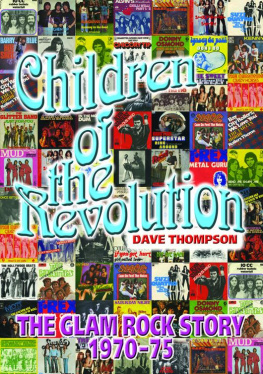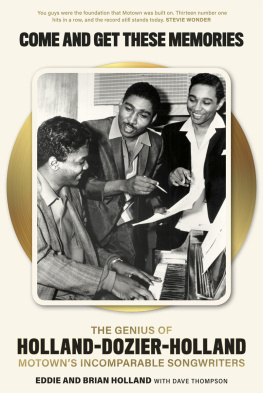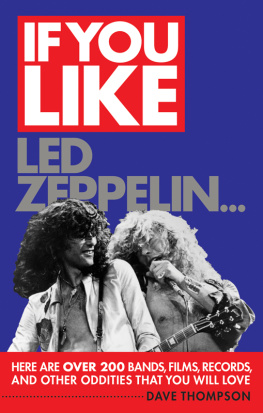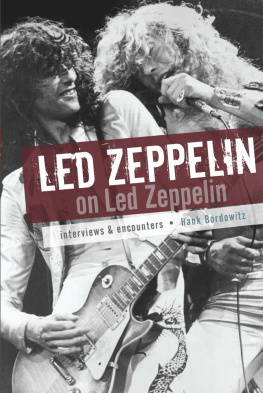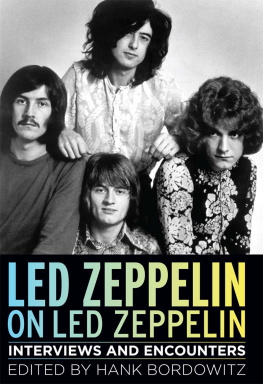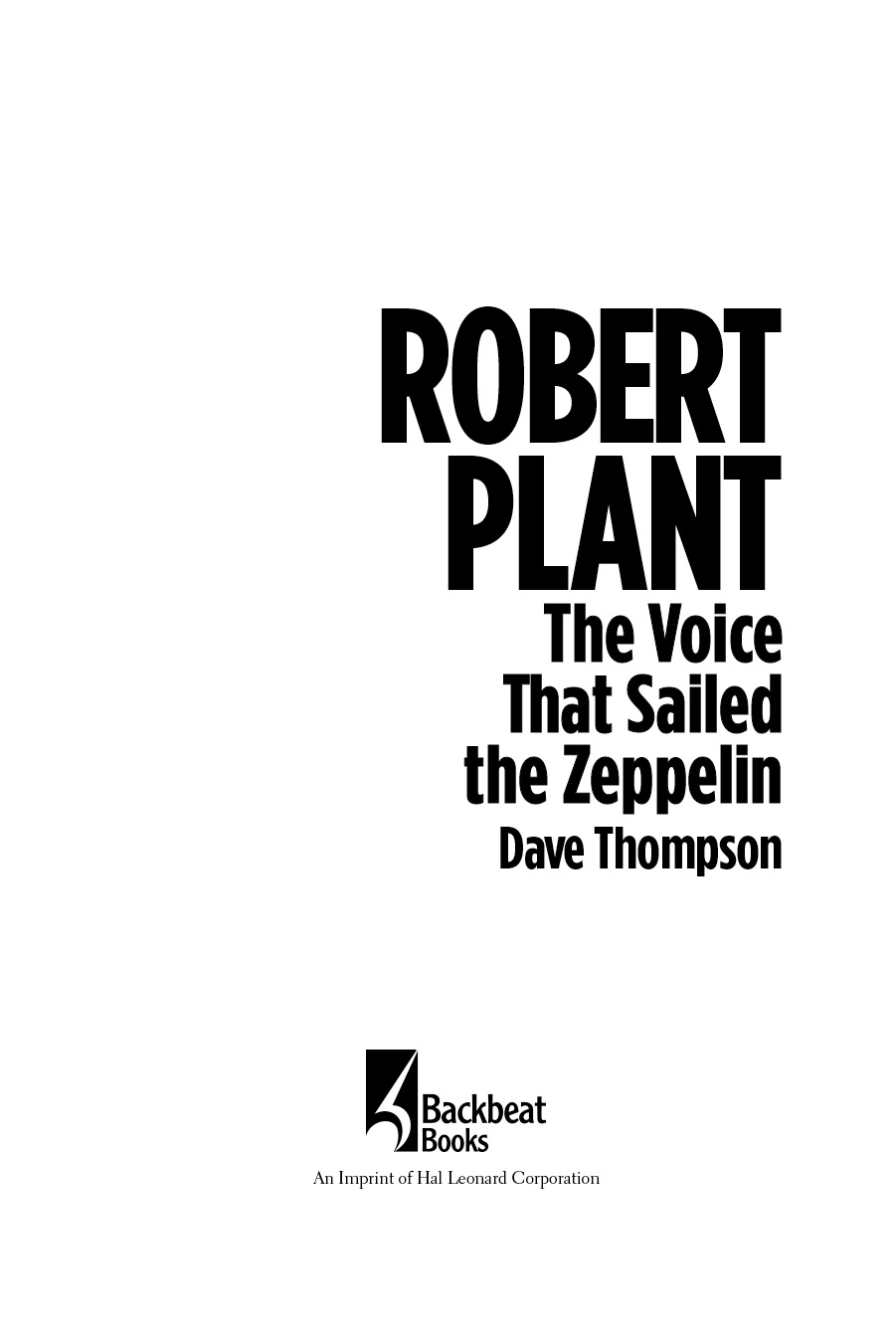Copyright 2014 by Dave Thompson
All rights reserved. No part of this book may be reproduced in any form, without written permission, except by a newspaper or magazine reviewer who wishes to quote brief passages in connection with a review.
Published in 2014 by Backbeat Books
An Imprint of Hal Leonard Corporation
7777 West Bluemound Road
Milwaukee, WI 53213
Trade Book Division Editorial Offices
33 Plymouth St., Montclair, NJ 07042
Printed in the United States of America
Book design by John J. Flannery
Library of Congress Cataloging-in-Publication Data
Thompson, Dave, 1960 January 3
Robert Plant : the voice that sailed the Zeppelin / Dave Thompson.
pages cm
Includes bibliographical references and index.
ISBN 978-1-61713-572-9
1. Plant, Robert. 2. Led Zeppelin (Musical group) 3. Rock musicians--England--Biography. I. Title.
ML420.P58T46 2014
782.42166092--dc23
[B]
2014027917
www.backbeatbooks.com
Contents
There is a debate that raises its beastly little head every time Robert Plant releases a new album. Every time a new piece of footage surfaces on YouTube. Every time, in fact, his name is mentioned in a room where three or four people might be standing. And it goes something like this:
He doesnt need the money. Now hes just out there singing oldies for the fun of it.
No, hes singing old songs because he hasnt written any new ones.
And why hasnt he written any new songs?
Because he doesnt have the need anymore. He just wants to enjoy himself.
Or: Because he cant cut it on his own. He cant do it without Led Zeppelin.
Both sides of the argument might, conceivably, have something going for them. At the same time, both are so simplistic as to be utterly contemptible. To suggest a musician is past it because he no longer wants to run with the same gang he hung with forty years ago is to be absolutely ignorant of the things that make a band a band in the first place. And to suggest that a love of singing other peoples songs is in some way easier than writing your own is to make a mockery of every interpretative singer from Billie Holiday to Rod Stewart, from Frank Sinatra to Elvis Presley.
Yet its an argument that wont go away, and in a way its the argument that inspired this book. Biographies of Robert Plant and Led Zeppelin (how easily the two names go together) are ten-a-penny today; with the exceptions of the Beatles and the Stones, and possibly Presley and Bowie, more books have been written and published about Zeppelin than any other band or performer of the rock n roll era.
The need for one more is probably not the most pressing concern facing twenty-first-century rock, all the more so as two more or less definitive tomes hit the bookshelves while this one was being written: Paul Reess Robert Plant: A Life and Barney Hoskynss Led Zeppelin: The Oral History of the Worlds Greatest Rock Band . Indeed, taken together, these two books lay out the lives and times of their subjects in almost forensic detail, not only through the pages of written history, but also through that most precious of all the commodities that lie at the historians disposal: the first-hand accounts of the people who were there while the history itself was being written.
Precious, but also misleading.
Ex-bandmates, ex-colleagues, ex-whatevers are very much like ex-wives. They see a lot, they remember a lot. And then they shape those memories, first through the prism of their own experiences with the person at the center of them, and then through their interpretations of the requirements of the person asking questions ten, twenty, forty years later. Reiterating, in other words, the same shallow sentiments as the fans we were introduced to earlier: betrayal, on the one hand, because a favored performer will no longer perform their favorites; weary acceptance on the other, because hes rich enough now that he doesnt have to bother.
It is often said by new divorcees that you can live with someone for years and years and never really know who they are. So it is with former bandmates. Early on, before fame and fortune come along, and youre still sharing the same toilet roll between four musicians and two roadies, you can say that you have few secrets from one another. But once fame does arrive, and everyones traveling in his or her own separate limo, each equipped with its own private bathroom (were speaking figuratively here, not literally), thats when you start to notice things. Bad things. Cruel things. Spiteful things. The things that stick in your craw and stick in your mind. Theres a reason why the vast majority of tell-all (or even tell-quite-a-lot) biographies seem to show their subjects in the worst possible light. And thats a big part of it.
This is not a tell-all biography. Frankly I could care less how many women Robert Plant might have slept with, how many he allegedly penetrated with recently acquired marine life, how many times he may have gotten high. And you should feel the same way. Welcome to rock n roll in the 70s. And the 60s. And the 80s, 90s and noughties too. Its what bands did, and what they still do today. Its called being young and bored and on the road, and you could take any account of one bands backstage misdemeanors, cross out their name and write in someone elses, and the stories would remain just as true. Or not.
Under any reasonable criteria, what matters is not what fame allows an artist to get away with. It is what the artist had to do in order to achieve that fame in the first place. That is what this book is about, and that is why the story takes the shape that I have given it. Life is chronological. But unless an artist is so single-mindedly one-dimensional that nothing can knock him off his musical course (in which case, he will be so boring that most people would have given up listening after the first two albums), a career is constructed from a series of loops, circuits, and sudden shifts, some of which follow a preordained course... a, b, c; but others of which apparently have no logic whatsoever... m, d, i.
This book follows that latter course.
It can, of course, be read as in a conventional, linear fashion. The even-numbered chapters, for the most part, trace Plants life from childhood until the end of Led Zeppelin; the odd-numbered chapters follow his subsequent solo-and-otherwise career. Thus rearranged, a life and career will spool out as straightforwardly as you could wish. But they will do so without the internal twists and integral turns that have enabled Plant to maintain the career as intriguingly as he has, and it is those twists and turns that are the real subject of this book, as they resolve themselves into an a, b, c of their own.
It is a fascinating journey, rendered all the more so by the knowledge that it still has a long way to go. Perhaps alone of the musicians who have survived from his generation, certainly over the past fifteen years or so, Robert Plant is unique in that he has never allowed his audience to second-guess his career; that every move he has madefrom the dissolution of the Page-Plant partnership in 1998 to his one-off album with Alison Krauss a decade later, from the Priory of Brion to the Sensational Space Shiftershas apparently taken him by surprise almost as much as it has caught his audience off guard.
Which, in turn, returns us to the squabbling acolytes we met at the beginning, and the reason their arguments can never be resolved. Because Robert Plant is not following a career course. He is following his dream. And dreams, as everyone who has ever had one can tell you, are rarely as straightforward as reality.


